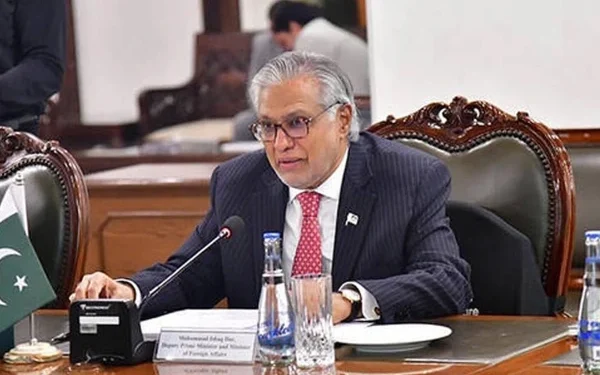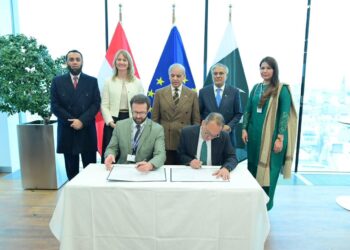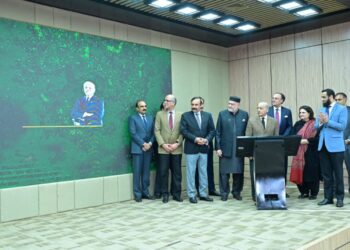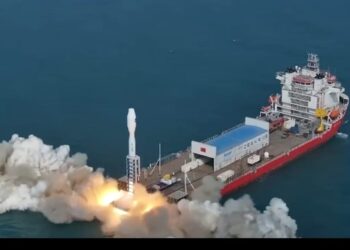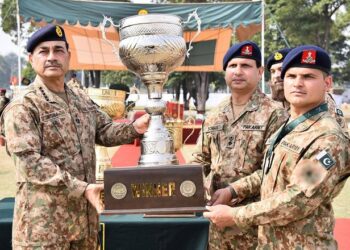Washington, D.C.: In a candid and thought-provoking address to the prestigious Atlantic Council, Pakistan’s Deputy Prime Minister and Foreign Minister, Senator Ishaq Dar, strongly condemned India’s ambitions of regional dominance, declaring that its hegemonic designs were effectively “buried between May 7 and May 10.” He emphasized that lasting peace in South Asia is not possible without a constructive and cooperative approach by all regional actors, particularly India.
Dar’s remarks come during a critical time in regional geopolitics, following heightened tensions between Pakistan and India, a fragile security climate in Afghanistan, and increasing global attention to Kashmir.
🕊️ The Call for Regional Peace and Stability
Addressing a gathering of diplomats, policy experts, and journalists in Washington, Ishaq Dar made a powerful case for regional de-escalation, urging all nations to play a constructive role in promoting peace, stability, and dialogue in South Asia.
“Our region cannot prosper while mired in conflict,” Dar stated. “We must prioritize diplomacy over militarization.”
He emphasized that conflict resolution, rather than power projection, should be the bedrock of foreign policy in South Asia. Dar noted that he had echoed the same message during a recent United Nations Security Council (UNSC) session just two days earlier, where there was, in his words, “unprecedented consensus” on the need for peaceful solutions to regional disputes.
📌 India’s Hegemonic Aspirations Challenged
One of the most striking points in Dar’s address was his firm stance against India’s perceived attempts to assert dominance in the South Asian region. He accused New Delhi of pursuing regional hegemony through both military escalation and diplomatic obstructionism, asserting that these efforts came to a head and ultimately collapsed between May 7 and May 10.
“India’s attempts to dominate and dictate to the region were buried between May 7 and 10,” Dar declared.
While Dar did not elaborate in detail on the exact nature of the events during these days, diplomatic insiders suggest he was referencing a major de-escalation in military tensions between the two nuclear-armed neighbors that had been quietly resolved through back-channel diplomacy.
⚠️ The Jammu and Kashmir Dispute – A Core Issue
In keeping with Pakistan’s longstanding foreign policy priorities, Dar stressed that the dispute over Jammu and Kashmir remains the most critical issue between Pakistan and India.
“Kashmir is not a bilateral issue — it is an international issue, one that lies at the heart of peace in South Asia,” he said.
He reminded the international audience that United Nations Security Council resolutions have upheld the right to self-determination for the people of Jammu and Kashmir, a right that, according to Dar, has been systematically denied by India for over seven decades.
He reiterated Pakistan’s opposition to India’s unilateral actions in August 2019, which included revoking Article 370 of the Indian Constitution — effectively ending the special status of Jammu and Kashmir. Dar called these moves “illegal”, “unilateral”, and a direct violation of international law, including the Geneva Conventions.
🧩 India’s Narrative of Terrorism – A Diversion Tactic
Ishaq Dar also accused India of weaponizing the narrative of terrorism to malign Pakistan’s global image and divert attention from its actions in Kashmir.
“India uses the slogan of terrorism to mislead the world and defame Pakistan,” he asserted.
He referred to the April 22 Pahalgam incident, where India alleged Pakistan’s involvement in an attack in Indian-administered Kashmir. Dar dismissed the accusations as baseless and politically motivated, saying India uses such incidents as propaganda tools during moments of internal or external pressure.
🛑 May 2025 Tensions: A Brink of Conflict Averted
Dar shed light on the tense situation in May 2025, when hostilities between Pakistan and India once again brought the region perilously close to military conflict. According to Dar, this surge in tension was driven by India’s traditional military posture and mutual distrust between the two nations.
“We were once again brought to the brink of destruction,” he said.
However, Dar credited back-channel diplomacy, international mediation, and constructive engagement by friendly countries, especially the United States, with helping to de-escalate the crisis. He thanked U.S. President Donald Trump and Secretary of State Marco Rubio for their diplomatic intervention, which reportedly played a decisive role in achieving a ceasefire.
💬 Ceasefire and Diplomacy: Pakistan’s Position
While expressing gratitude for international mediation, Dar emphasized that Pakistan remains committed to peace, but that peace must be based on equality and justice.
“We believe in peace. We have never initiated conflict — we respond only in self-defense as per Article 51 of the UN Charter,” he affirmed.
Dar noted that military readiness alone cannot guarantee long-term peace. “We cannot leave the region’s fate to chance and last-minute intervention. We need durable peace based on dialogue and cooperation,” he added.
🚆 Regional Cooperation Through Connectivity: Trans-Afghan Railway
In a significant shift from geopolitics to regional connectivity, Dar pointed to Pakistan’s recent initiative on regional infrastructure development as a model for peaceful cooperation.
He referred to the July 17, 2025 trilateral agreement signed in Kabul, involving Uzbekistan, Afghanistan, and Pakistan for the Trans-Afghan Railway project. The agreement represents a major step toward integrating South and Central Asia through trade, rail, and transit connectivity.
“This is an example of how we want to engage our neighbors — not as rivals, but as coordinators in regional development.”
Dar expressed hope that such projects would serve as confidence-building measures that encourage regional actors to move from confrontation to collaboration.
📢 India’s “Net Security Provider” Narrative Debunked
One of the most significant statements in Dar’s address was his dismissal of India’s ambition to be seen as the “net security provider” in South Asia.
“India’s claim of being a net security provider and regional leader has collapsed,” Dar said. “Between May 7 and 10, those illusions were shattered.”
Dar argued that real leadership is demonstrated through conflict resolution, not coercion. He challenged the idea that military might and political aggression qualify a state to lead the region.
🕊️ The Way Forward: Peace Through Dialogue and Law
Wrapping up his speech, Dar laid out Pakistan’s vision for a peaceful South Asia:
- Dialogue over Hostility: Return to diplomatic engagement based on mutual respect.
- Adherence to International Law: Resolve conflicts through UN resolutions and established legal frameworks.
- People-Centric Development: Focus on economic growth, human development, and regional trade.
- Trust-Building Initiatives: Use trade and infrastructure to build mutual trust.
- Reject Hegemony: Avoid power imbalances and respect the sovereignty of all regional nations.
🌍 Global Implications of Regional Peace
Ishaq Dar concluded with a message for the international community, stating that South Asia’s stability is essential to global peace. The region is home to a quarter of the world’s population, and continued tensions between nuclear-armed states could pose existential risks far beyond South Asia.
“Peace is not only our need — it is the world’s responsibility,” Dar declared.
📌 Conclusion: A Regional Reset?
Ishaq Dar’s statement at the Atlantic Council marks a clear signal from Pakistan that it is willing to pursue diplomacy, regional cooperation, and infrastructure development as alternatives to conflict and military brinkmanship.
His comments indicate that India’s recent assertive posture, particularly in Kashmir and the broader South Asian sphere, has been effectively challenged. Whether or not this signals a true regional reset remains to be seen, but the message from Islamabad is clear: Pakistan seeks peace — not surrender — and envisions South Asia as a region of cooperation, not conquest.
















